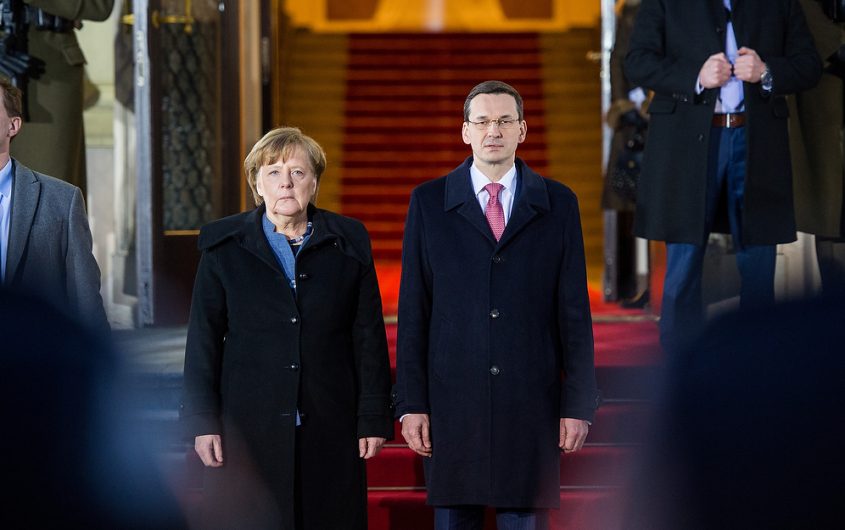
Kancelaria Premiera via Flickr
Do Disputes over History Define German-Polish Relations?

Lily Gardner Feldman
Senior Fellow
Dr. Lily Gardner Feldman is a Senior Fellow at AICGS. She previously served as the Harry & Helen Gray Senior Fellow at AICGS and directed the Institute’s Society, Culture & Politics Program. She has a PhD in Political Science from MIT.
From 1978 until 1991, Dr. Gardner Feldman was a professor of political science (tenured) at Tufts University in Boston. She was also a Research Associate at Harvard University’s Center for European Studies, where she chaired the German Study Group and edited German Politics and Society; and a Research Fellow at Harvard University’s Center for International Affairs, where she chaired the Seminar on the European Community and undertook research in the University Consortium for Research on North America. From 1990 until 1995, Dr. Gardner Feldman was the first Research Director of AICGS and its Co-director in 1995. From 1995 until 1999, she was a Senior Scholar in Residence at the BMW Center for German and European Studies at Georgetown University. She returned to Johns Hopkins University in 1999.
Dr. Gardner Feldman has published widely in the U.S. and Europe on German foreign policy, German-Jewish relations, international reconciliation, non-state entities as foreign policy players, and the EU as an international actor. Her latest publications are: Germany’s Foreign Policy of Reconciliation: From Enmity to Amity, 2014; “Die Bedeutung zivilgesellschaftlicher und staatlicher Institutionen: Zur Vielfalt und Komplexität von Versöhnung,” in Corine Defrance and Ulrich Pfeil, eds., Verständigung und Versöhnung, 2016; and “The Limits and Opportunities of Reconciliation with West Germany During the Cold War: A Comparative Analysis of France, Israel, Poland and Czechoslovakia” in Hideki Kan, ed., The Transformation of the Cold War and the History Problem, 2017 (in Japanese). Her work on Germany’s foreign policy of reconciliation has led to lecture tours in Japan and South Korea.
Three recent or upcoming events remind us of the centrality of history in the German-Polish partnership: foreign minister Heiko Maas’ visit to Auschwitz on August 20, the 79th anniversary of the German invasion of Poland on September 1, and the 100th anniversary of Polish independence from the German Empire on November 11. The imprint of the past on German-Polish relations is the basic premise of a fascinating and rich new book edited by the Polish scholar Olga Barbasiewicz: Postwar Reconciliation in Central Europe and East Asia (Peter Lang 2018). The part of the book dealing with reconciliation between Germany and Poland (there are also four chapters on Japanese-Korean relations) argues that up until 2015 and the arrival of the populist and nationalist Law and Justice (PiS) government in Poland the past had largely receded as a source of tension in the partnership, but that this feature is reversible. The second argument concerning history is that reconciliation involves forgetting, a point that is refuted in significant part by the scholarly literature on reconciliation where remembering is built into the fabric as an active thread in the new relationship.
Up until 2015 and the arrival of the populist and nationalist Law and Justice (PiS) government in Poland the past had largely receded as a source of tension in the partnership, but this feature is reversible.
The edited volume usefully traces the postwar evolution of reconciliation in seven decades from 1945 until 2015 and the role that historical contention played in that development. In nuanced, separate chapters by Barbasiewicz, Beata Turkowicz, and Justyna Turek, one can follow history’s part in three acts, from defining (or what we could call dominant) to shaping (or what we could call background).
The first stage spans a period involving issues emerging from World War II: the questions of border recognition; the plight of expellees; and the Cold War’s mutual non-recognition. The second stage arrives with the breakthrough by the Polish and German churches in the 1960s (both Catholic and Protestant), issuing documents that accepted Poland’s Western border and the loss of territories previously held by Germany and recognized the suffering of both German expellees and Poles. The Polish Catholic Bishops’ letter famously granted forgiveness to the Germans and asked for forgiveness. The third and final stage is marked by the “golden age” of flourishing bilateral institutions at both the governmental and societal levels after the fall of the Berlin Wall in 1989 and subsequent German unification; it ended in 2015.
However, in this third stage, controversy over history threatened to dominate again in the early 2000s, with the various feuds over a German plan to build a Center against Expulsion in Berlin, focusing on Germans as victims; property and compensation claims against Poland by the Prussian Claims Society; and a claim from the Polish Sejm for reparations from Germany for wartime material losses. Germany and Poland eventually came to agreements, even as the disputes over history became politically heated in the rule of the Kaczynski twins as prime minister and president. Germany adopted a patient and non-confrontational stance and Poland tried to be constructive and open.
The current German-Polish relationship is once again challenged broadly by questions of history with Polish politicians demanding reparations from Germany, including Jaroslaw Kaczynski’s June 2018 demand for $850 billion in compensation, and various portrayals of Polish suffering in World War II. The fight over the past is accompanied by disagreements in other areas: the nature of the EU; the EU’s migration strategy; the Nordstream gas pipeline between Russia and Germany. The Polish government’s attacks on the judiciary and the enactment of a law to make punishable statements indicating Polish complicity in the Holocaust make matters even more difficult and precarious. Fittingly, Olga Barbasiewicz notes that “the very start of reversing the process of reconciliation starts with the use of historical memory to make profits in internal politics” (p. 12).
The fight over the past is accompanied by disagreements in other areas: the nature of the EU; the EU’s migration strategy; the Nordstream gas pipeline between Russia and Germany.
Angela Merkel has once again refrained from personal and political statements, instead emphasizing, once more, Germany’s acceptance of guilt and responsibility for World War II and the Holocaust.
There have been some positive signs that history will not derail the reconciliation the two countries have achieved over more than seventy years. First of all, the Polish foreign minister Jacek Czaputowicz has suggested that a resolution of the reparations issue is not pressing. Second, there have been some concrete proposals for handling the historical issues: a commission of scholars to examine reparations claims and to launch a societal dialogue between Germany and Poland on this topic; the erection of a monument in Berlin to commemorate the Polish victims of World War II. Finally, there is the work of organizations that permit joint German-Polish treatment of remembrance and history such as the German Historical Institute in Warsaw, the German-Polish Textbook Commission, the joint German-Polish history textbook. All of these efforts demonstrate that history can be what I have called a “constructive irritant,” in which differences over the past are not removed but “integrated.”
In addition to positive historical dimensions is the reality of active reconciliation in so many other areas that this book elucidates well. Beata Jurkowicz examines the multitude of institutionalized non-governmental organizations that practice reconciliation on a quotidian basis. She also looks at the impact of reconciliation on non-governmental actors in Poland, particularly the German minority which has been active in deepening and expanding ties. Olga Barbasiewicz considers the role of the international environment in propelling reconciliation, which leads us to think about common external threats like Russia. Justyna Turek focuses on the past role of the European Community and the European Union in fostering German-Polish reconciliation and in providing, since Polish accession in 2004, a productive forum for the airing and resolution of differences.
Placing the issue of ties in a much larger realm of reconciliation habits leads us to view the past’s role as shaper of the German-Polish relationship, not the definer. History will be remembered but not disruptive. If reconciliation is reversible as the Barbasiewicz book argues, then have we reached the breaking point? In the immediate post-1989 period Poland’s foreign minister Krzysztof Skubiszewski espoused a political realism captured in the term “community of interests” between Germany and Poland. In an interview earlier this year with Der Spiegel, Poland’s current prime minister Mateusz Morawiecki emphasized that Poland was “pragmatic” in its conduct of external affairs. When asked whether Germany was still Poland’s most important partner in Europe, he replied “yes.” He went on to say that for him “the glass is half full and not half empty,” which leads us to infer that while important, history does not define German-Polish reconciliation.








